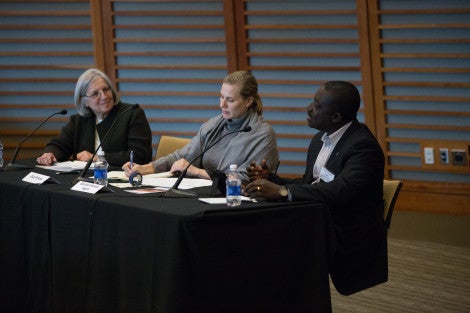April 24, 2015—The global community has made gains in fighting malaria, but those advances are tenuous and multi-sector partnerships are needed to eradicate the disease. That was the consensus among experts in the field who gathered at a forum co-hosted by Harvard’s Defeating Malaria initiative on April 24 to mark World Malaria Day. The event, Partnerships for Malaria Elimination: Lessons and Opportunities, focused on the need to build partnerships between governments, academic researchers, and the private sector.
According to the World Health Organization, there were an estimated 198 million malaria cases in 2013 and an estimated 584,000 deaths. In a video message to the audience at the Joseph B. Martin Conference Center, Ray Chambers, the United Nation’s Secretary-General’s Special Envoy for Malaria, said that progress has been made in fighting the disease: Since 2000, there has been a 58% decrease in child deaths from malaria in Africa. Chambers said more gains are on the horizon.
“Today 55 countries are on target to reduce malaria incidences by 75% by the end of this year, and 26 countries are on a clear path towards elimination,” he said, adding that cooperation at multiple levels will make that possible. “Partnerships have helped drive innovation, improve measurement, and provide the management expertise that strengthens our work. They hold the key to new solutions and new technology.”
Dyann Wirth, Richard Pearson Strong Professor of Infectious Diseases and Chair, Department of Immunology and Infectious Diseases at Harvard T.H. Chan School of Public Health, said that type of holistic approach has driven the work of the Defeating Malaria initiative since its inception in 2011.
“We brought together individuals from across the spectrum of the malaria world, and across Harvard, trying to understand the fundamental aspects of this disease from its biology and transmission, all the way through the social, behavioral, and policy [components] to develop tools to attack the problem.”
Wirth moderated a panel that focused on the unique challenges of providing those tools and interventions in faith-based communities, where there can be tension between traditional healers and technologically focused medical personnel. Panelists discussed the efforts of the NetsforLife project, a partnership with the Episcopal Relief & Development organization, which has provided more than 22 million insecticide-treated mosquito nets across Africa.
Wirth said that the project is an effective convergence of a faith-based approach with a more business-oriented method, bringing a different approach to malaria control than organizations with a medical or health delivery background. Wirth pointed out that it is a strategy that relies on cooperation and takes into account the multiple factors beyond medical treatment that can affect malaria control efforts. She believes this community-based approach can help reduce the resistance to those new initiatives. “Education and knowledge backed up by evidence allows people to see and actually evaluate [interventions] for themselves.”
In addition to implementation of malaria control measures, forum attendees also heard about various technological advances that could allow for more rapid diagnosis of the disease.
The Corporate Alliance for Malaria in Africa and GBCHealth co-sponsored the event.
